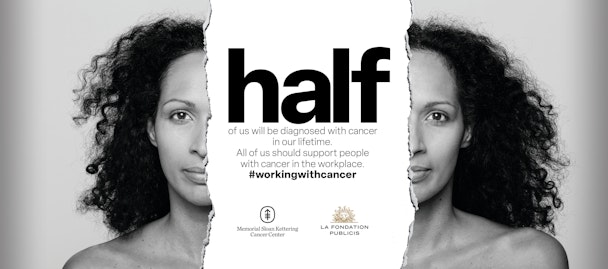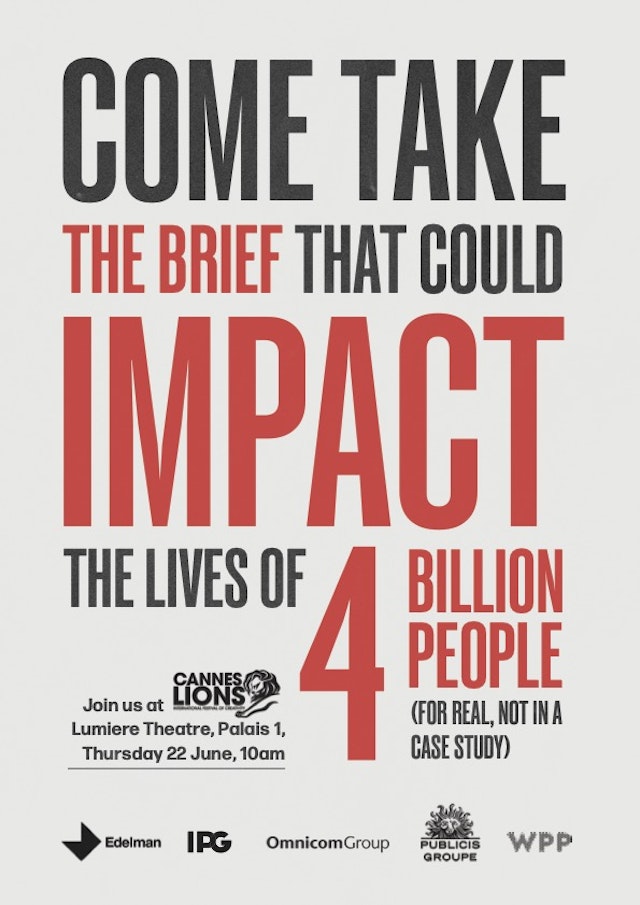Publicis, IPG, Omnicom, WPP & Edelman issue open brief for cancer stigma campaign
The French advertising group has joined with industry rivals to issue a call for pitches for a worldwide stigma-busting creative campaign.

Publicis has called on creatives across the industry to participate in an open brief to reduce cancer stigma / Publicis Groupe
Advertising creatives from across the global marketing industry have been invited to submit ideas for a new global campaign tackling the stigma faced by people with cancer in the workplace.
The brief is the next iteration of Publicis Groupe chief exec Arthur Sadoun’s efforts to break the culture of silence around living and working with cancer and is a cross-industry effort involving rival holding companies IPG, Omnicom, WPP and Edelman.
In the wake of Sadoun’s own recovery from a cancer-related illness in 2022, he called upon attendees of the World Economic Forum in Davos to build ‘recovery-forward’ workplace cultures. A mass media campaign targeting consumers, including a Super Bowl spot, followed. Earlier awareness efforts included a Christmas HPV awareness campaign starring Sadoun, Publicis chairman Maurice Lévy and Hollywood actor Michael Douglas.
Explore frequently asked questions
Those efforts have been received well – over 600 companies have signed the pledge unveiled at Davos – and the January spot won a Lion this week in Cannes.
Carla Serrano, global chief strategy officer of Publicis Groupe, tells The Drum she hopes the campaign will reach workplaces in every sector: “We’re using the power of the advertising industry to touch every industry and company, no matter what size so that it becomes normalized. We’re hoping to get the best work possible to erase the stigma of cancer in the workplace.”
Edelman, the global creative and comms agency, joined Publicis’ efforts after founder Richard Edelman – himself a cancer survivor – reached out personally to Sadoun.
Advertisement
Serrano adds: “From the very beginning, as the movement started to take shape, we really did not want this to be a Publicis thing. Initially, we were going to pass the baton, but as we talked to more and more people about this and with Cannes coming up, people said: why don’t we do a brief?”
The five companies are calling on creatives to submit ideas between July 10 and September 16. ‘The Big C’ aims to be a campaign that “defies culture” to break down the stigma around cancer treatment. It’s set to run on World Cancer Day next year, backed by £100m of donated media spend.

Serrano says: “The best briefs are both tight and wide. This is tight because the mission is so specific, but it’s a hard challenge. Erasing stigma is dealing with perception, behavior, policy, actions and expectations. To some degree we’ve raised awareness of the issue, so now it’s about how we actually create that recovery forward culture and how we get more and more companies in.”
Advertisement
Judy John, global chief creative officer of Edelman, adds: “There are two angles. One is what can companies do to be better advocates. The other is, what are we doing to help the community when you’re going through cancer treatments and surviving cancer?”
Submissions will be judged by a panel of top creatives, including John at Edelman, FCB’s Susan Credle, Leo Burnett’s Chaka Sobhani, Luiz Sanches of BBDO North America and VMLY&R’s global CCO Debbi Vandeven.
Serrano says the dream is to have “one central idea, one key message,” that can plug into different markets, in both B2B and B2C contexts. The hope is that the campaign can speak to audiences across different cultural contexts and healthcare systems, too. “What it means in India, for example, is different. It’s a very tough healthcare environment and the idea that [an employer] is supporting you through that is incredible, though it’s not typically done by many companies in that market. So, the cultural nuances will be so important.”
She says the primary outcome of the campaign will be more companies signing up for Sadoun’s Davos pledge and in the changes they make. It’ll be monitoring the number of companies that join, the number of companies that change their programs and the number of companies that begin to extend commitments out to caregivers. “And then there’s the soft stuff, about how you feel about the cancer program in your workplace – we’ll be doing a qualitative survey too,” she says.
Suggested newsletters for you
John adds: “It’s about changing the outcome for communities, for individuals and the people supporting them. I think that by throwing out a global brief, you will start to see solutions for the different people involved on the journey.”
Serrano says Publicis is also in the early stages of planning a medical study with healthcare partners, with the intention of investigating the benefits to cancer recovery of a supportive workplace.
John concludes that she hopes employers are more willing to discuss openly, and consider directly, the impact that ill health can have on their staff after the three years of the pandemic. “Post-Covid, I think everyone is more empathetic to the needs of employees.”

